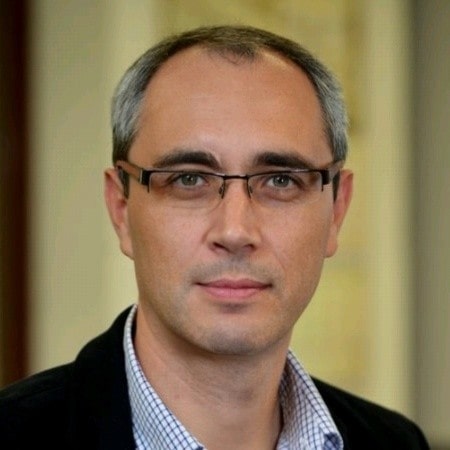Helen Antonenko, the First Deputy CEO of the Government Contact-center of Ukraine: “Based on Corezoid we processed more than 1 million online-chats in 2020”
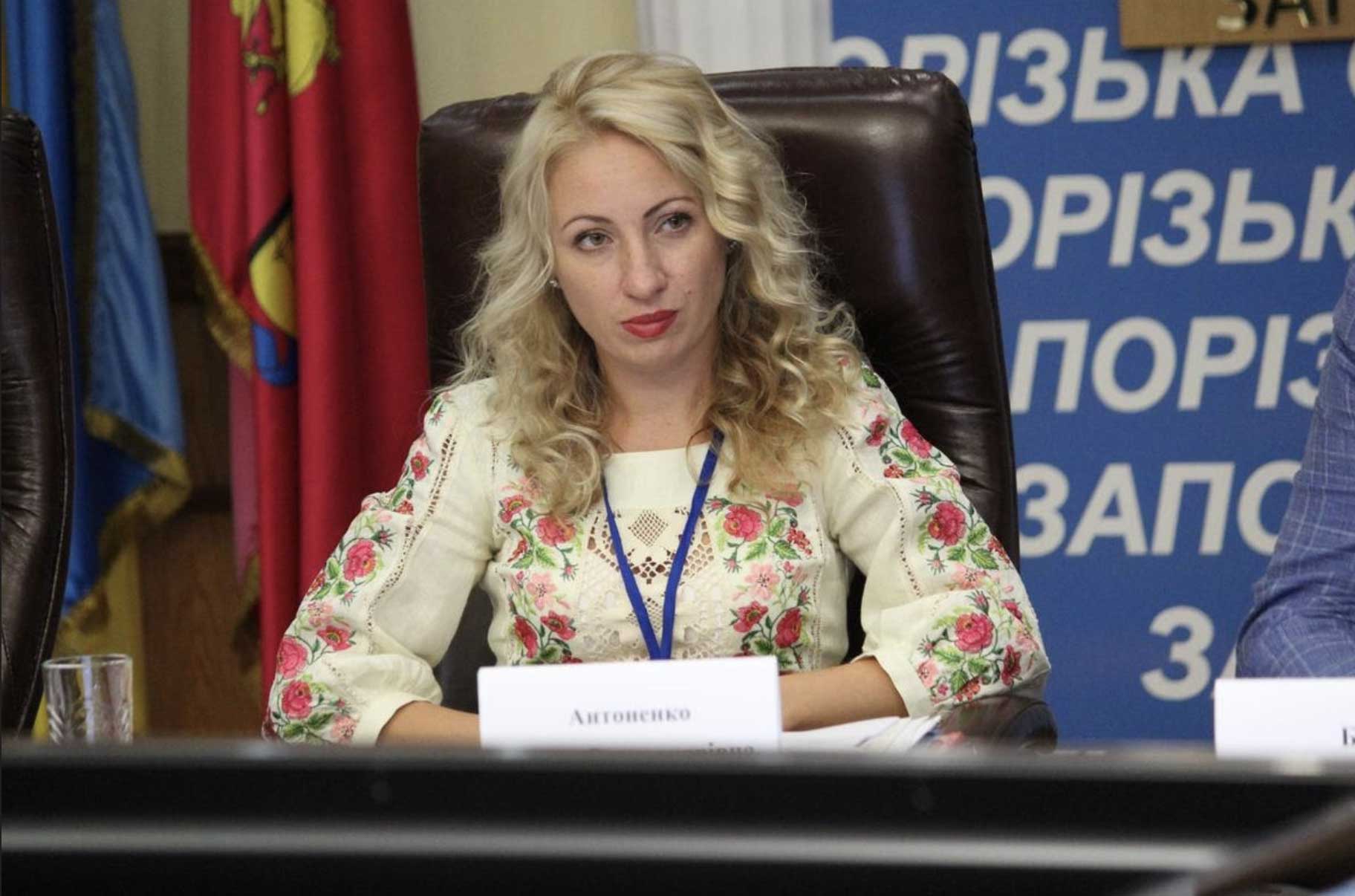 |
|---|
| Helen Antonenko, the First Deputy CEO of the Government Contact-center of Ukraine |
Helen, let’s start from the very beginning. Where did you study?
In 1999 I got into a university in Kyiv. It was the Institute of Housing and Communal Services. I don't know if it's still working. I studied there a little, and immediately after the 3rd year I went to work.
Where?
Initially, I worked in my hometown of Khmilnyk, Vinnytsia region. And then I moved to Kyiv in 2003. My career immediately began with government agencies: the State Judicial Administration, territorial divisions and departments of the Ministry of Social Policy etc.
In 2009, the Prime Minister put forward the idea of creating a Social Contact Center. That was the beginning of May. Holidays, barbecues, laughter on the streets. And here I have a phone call, they offer to join the "startup" – the creation of a Contact Center within the Ministry of Social Policy. It was the first state call center in Ukraine under the auspices of Prime Minister Yulia Tymoshenko.
In addition to finance, I also studied law, and just had the necessary competencies to work on the project. On May 27, 2009 our institution - the Social Contact Center under the management of the Ministry of Social Policy was registered. Lyudmila Denisova was the minister then, and she managed the first activities in the project with a strong hand.
It all started with one office in the building of the Ministry of Social Policy on the 6th floor. There were 3 desks, 2 computers and 1 telephone headset.
On the first working day, we stayed up all night and wrote down our action plan for setting up a government hotline in a regular notebook.
Who was the second person to start working with you?
Probably not the second, but the first. It was the Director - Anastasia Savenok (today – Nenka), one of the top managers of call-centers in Kiev. On the first working day, we stayed up all night and wrote down our action plan for setting up a government hotline in a regular notebook. I described a part from the point of view of the state bureaucratic mechanisms, how the call center should work, and Anastasia – as the bearer of competences on call centers. We described the action plan for the first month and reported to Minister Lyudmila Denysova that we are starting to recruit the first 50 employees.
It was planned that 2 shifts of 20 people each would work in the basement of a small 3-storey building next to the Ministry of Social Policy. Another 10 people were a director, an accountant, a computer systems engineer, and an analyst.
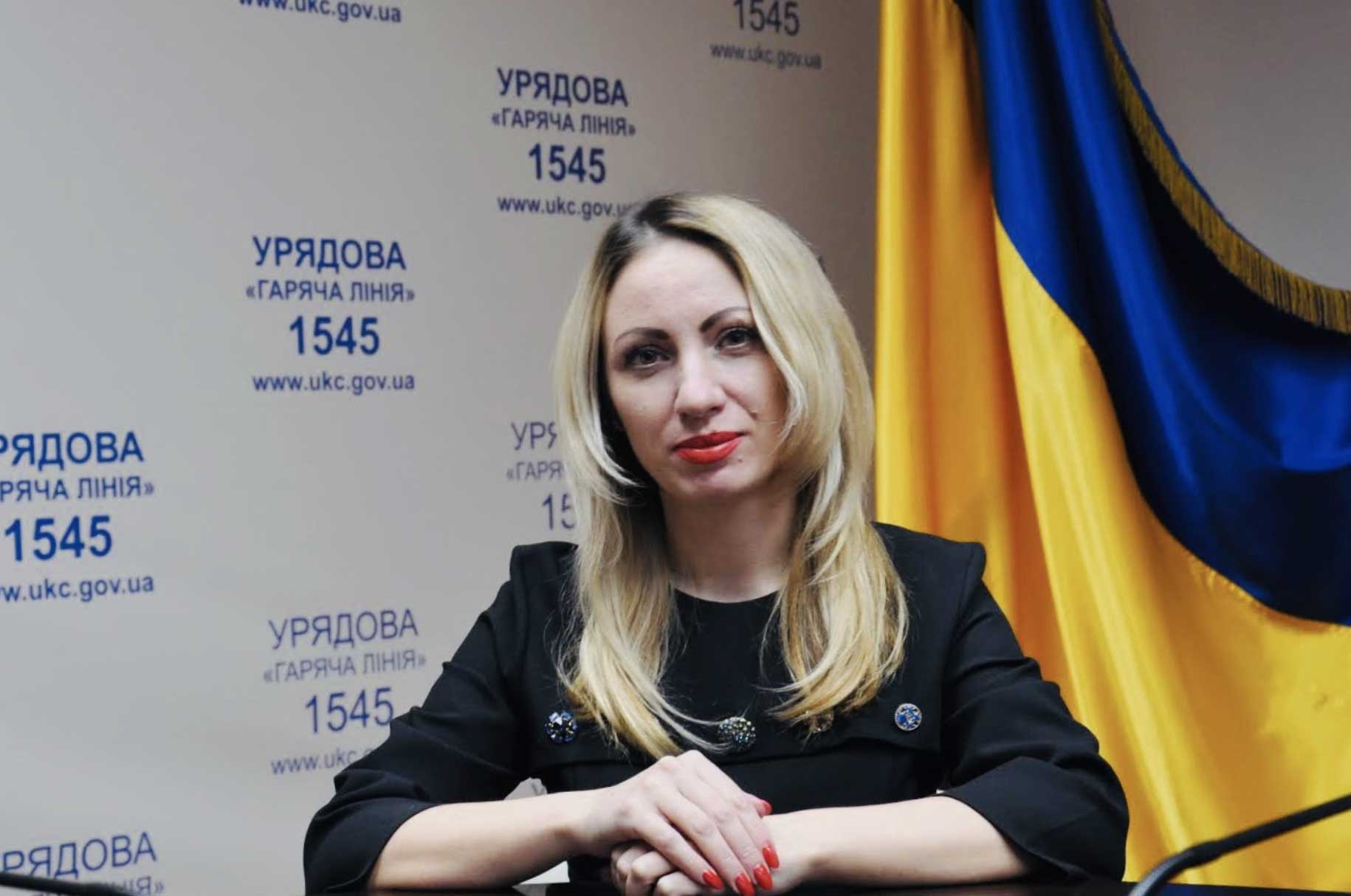 |
|---|
When did the first call come in?
The official opening of the contact center took place on July 24, 2009, with the participation of the Prime Minister. Yulia Tymoshenko visited the contact center together with journalists, but it was difficult to give an interview: the phones rang loudly, the room was small.
Yuliya Volodymyrivna then said: “Operators don't even have time to pick up the phone! It should not be so. The Center needs to be expanded at least 5 times.” We were receiving more than 1000 calls per day from 20 consultants. We were given 2 months to expand 5 times. For us, the first and second floors in the same building of the Ministry of Social Policy were urgently vacated, where repairs began immediately. The stucco was falling on our heads when interviews with future consultants were held. Instead of 40 operators, we needed to have 200 in 2 months.
I then moved half of the wardrobe to work, including a toothbrush. The first interviews started at 8 am. Yulia Volodymyrivna promised to return on September 25, 2009 and personally check the readiness of the expanded contact center.
Fortunately, the Ministry of Social Policy did not abandon us and helped a lot. We made it. On September 25, 2009, the staff was completed, the premises were ready, and the Prime Minister's order was fulfilled.
I liked being a manager, HR person, and a lawyer at the same time. In July 2010, the Social Contact Center was transferred directly to the Secretariat of the Cabinet of Ministers of Ukraine and renamed to the Government Contact Center.
In 2019, under the auspices of the Deputy Minister of the Cabinet of Ministers of Ukraine Yulia Guseva, for the first time since 2009, our staff increased by a quarter, the Center began to provide consultations not only by phone but also in online chats.
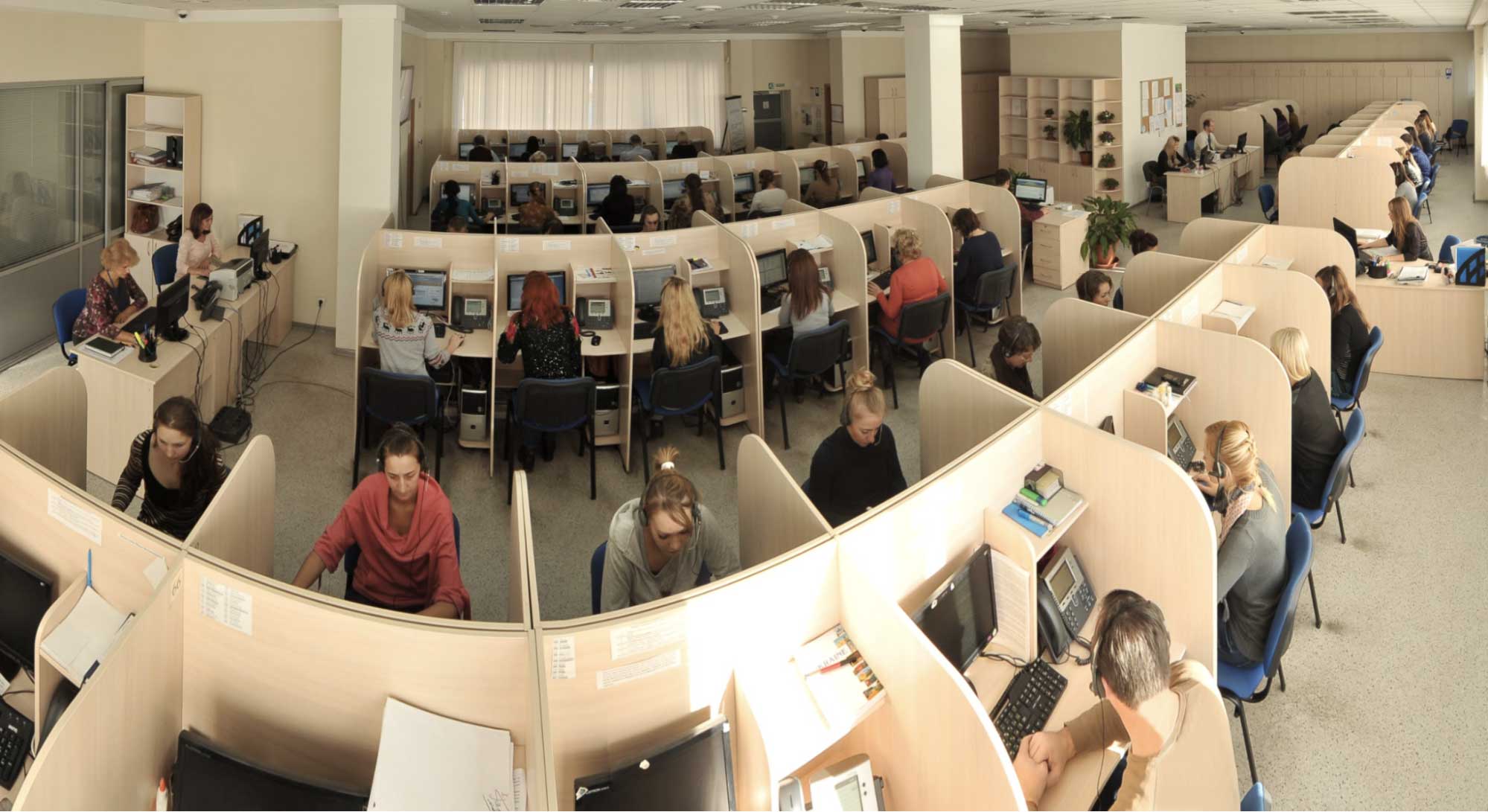 |
|---|
| The Government Contact-center operators at work |
What is the advantage of online chats over calls?
Thanks to the Sender and Corezoid platforms from Middleware Inc. company, we are able to support citizens in chats. This significantly relieves the phone hotlines and operators’ workload. People don't have to wait in a queue, when calling. You can write in the chat and wait comfortably for the answer. Also one consultant can communicate simultaneously with several people in a chat, which is not possible by phone.
How can somebody get a job at the Contact-Center? Are there any internship programs? How do you motivate people?
In 2020, when Dmytro Dubilet was the Minister of the Cabinet of Ministers, on his initiative salaries in the Center were increased, as well as a rating system and KPIs (key performance indicators) were introduced. There are currently no vacancies in the Center. The headcount is full. But our pain is that young people after 1-2 years of work at the Center gain experience and go build careers in other companies.
Unfortunately, the number of consultants (operators) is not enough now to quickly answer the volume of questions from citizens, which we have today, and which is constantly growing.
And how to make these new vacancies appear? Should the staff limit be expanded?
Yes. But it is almost as difficult as rebuilding the contact center from scratch again. It is necessary to approve additional state budget expenditures, review salaries, equip additional premises, and increase server capacity. At the same time, the pandemic has changed labor laws, and we have more opportunities to work with people who want to work remotely from home. Of course, it will be necessary to organize their distance learning, testing, quality control. We can also take people to practice. Students of the Kyiv National T.G. Shevchenko University, Kyiv University of Market Relations and the Academy of Labor, Social Relations and Tourism have already completed their practise with us.
What are the topics, that you provide consultations upon?
The list of topics is wide, and it is changing constantly. Registered appeals may belong to the competence of 110 different executive bodies, enterprises, institutions, organizations that are users of the software and hardware complex of the Unified system of citizens’ appeals processing.
One of the applicants registered 600 appeals in one night.
There is a problem with telephone pranks. People often abuse their right to make a call. Article 40 of the Constitution of Ukraine states that a citizen has the right to an unlimited number of appeals to state bodies. Bad guys can call 20-40 times a day. One of the applicants registered 600 appeals in one night. He simply copied the text and pasted it back, changing a few words. The legislation stipulates, that if an appeal differs in at least one word, it is another appeal. And we must take all this into consideration. The Law of Ukraine “On Citizens' Appeals” is outdated. It needs change.
In 2020, we processed 1,374,770 calls and 1,172,509 chats based on Corezoid, Sender.
In this Law, for example, there is Article 26, which states the responsibility of a citizen for slander, discrimination, insults to a state body. But in the Code of Ukraine on Administrative Offenses such liability and the relevant article in fact does not exist. And that's why today people call and write to us how much they have the desire in the absence of a real need.
Sometimes emotionally unbalanced people reach out, and just people who want to talk. They do not need to register appeals. They just find psychological support in the contact center. One of the applicants called 60,000 times a year.
30% of people are those who reach out to the Contact-Center regularly. In 2020, we processed 1,374,770 calls and 1,172,509 chats based on Corezoid, Sender.
By the way, this year marks the 12th anniversary of the Contact-Center, and it is such an interesting coincidence that on February 1 this year, 12 million appeals to the government hotline were registered since its establishment.
Is the number of appeals growing?
Yes. And the demand for online chat with the Government Contact Center is constantly growing. Fortunately, problems are often solved directly in the chat, and there is no need to register an "appeal".
Why is this important?
The "appeal" is a separate document. An electronic registration card is created at the request of the Center, which is further distributed to the state body, who needs to reply to the citizen. The term for consideration of the appeal is usually 15 days. Appeals are considered and resolved within no more than one month from the date of their receipt. And it could take up to 45 days with prior notice to the applicant.
All this creates an additional burden on the work of state institutions. Fortunately, at the Center, we close approximately 50% of all issues at our level, providing advice (by phone, chat) immediately and thus relieving other authorities.
For example, in Ukraine there are more than 70 different “hotlines” at different government bodies. And often it's just one phone line that works 2 hours a week.
According to the Government Decision 976, we constantly collect statistics and submit analytical and statistical reports to the Secretariat of the Cabinet of Ministers.
All executive bodies have statistics on appeals. We also keep statistics on the SLA of responses of government bodies to citizens' appeals.
Over the years, we have built a holistic and effective system of communication with citizens. However, some government agencies are setting up their own hotlines. For example, in Ukraine there are more than 70 different “hotlines” at different government bodies. And often it's just one phone line that works 2 hours a week.
We work with the latest technologies: CISCO for telephony, Corezoid and Sender for online chats, etc.
How does the Government Contact Center work with other public authorities?
The Government Contact Center interacts (as defined by the Government decision № 976) through the software and hardware complex of the Unified system of processing of appeals, which includes CRM and various software resources. Other authorities visit us to see how the work is organized and learn from the experience. We work with the latest technologies: CISCO for telephony, Corezoid and Sender for online chats, etc.
We were contacted by the National Police, the State Tax Service, the Ministry of Environmental Protection and Natural Resources, the Ministry of Foreign Affairs, the Ministry of Social Policy, the Ministry of Digital Transformation, the Ministry of Education and Science, and the Ministry of Veterans.
When a person writes in the “Diia” mobile app, are these chats routed to the Government Contact Center?
Yes. On November 27, 2019, a pilot project was launched according to the Government Decision #972. In particular, this resolution referred to the possibility of organizing online consultations in chat on the basis of the Government Contact Center after chat is initiated from the widgets on the websites of various public authorities.
We set up more than 20 channels for receiving chats on various e-services (rights and technical passport, ID-card and biometric passport, birth certificate, “FOP” assistance during quarantine, etc.). Consultations on all these topics are available on “Diya” portal and the Diya mobile application.
There was also talk of a mandatory memorandum with the Center. Several memoranda have been concluded. Today, the Center organizes chats and provides online consultations on the web resources of the Ministry of Social Policy, the Ministry of Foreign Affairs, the Ministry of Environment and Natural Resources, the Ministry of Education and Science (for the education campaign), the Ministry of Digital Transformation.
 |
|---|
| “Diya” mobile app lets You reach out to the Government Contact Center |
At the same time, the fact remains: many government bodies would like to start providing online consultations in chat, but the Center's staff capacity is not enough.
So you can just come to another government agency and help them in a friendly way to set up consultations in online chats?
Yes. We can come and help to set up. But we can’t process the flow of appeals using operators of the Government Contact Center.
In total, we process appeals for approximately 2,000 topics.
What were the TOP-5 topics of appeals for the last year?
Social protection, utilities, pensions, activities of officials, corruption and coronavirus. Can You imagine? Coronavirus is only in the 5th place. Social issues still worry Ukrainians more. In total, we process appeals for approximately 2,000 topics.
Do you remember any funny cases?
A child called recently. Santa Claus did not deliver him a present for the New Year. The child wondered if it was possible to register the appeal. We gave a consultation, called his mother back, and resolved the issue.
We are often confused with emergency care. Once the mother was stuck in a blizzard in the field, and could not call 103. Fortunately, each regional administration has identified a person responsible for responding to emergency appeals. We managed to find a car and doctors. Childbirth took place right in the field.
Our main KPIs are the knowledge of operators, the quality of dialogues, the average duration of dialogues, the speed of responses in chats, the level of independence in processing appeals, activity, i.e. the percentage of active time of the operator, and the level of satisfaction of applicants.
What KPIs do You track?
There is a resolution of the Cabinet of Ministers №91 of February 5, 2020, which has 3 documents. One of them is the provision on remuneration of the Center's employees. It ties the salary to the fulfilment of KPIs. The Center's salary is divided between administrative staff and consultants who process applications.
The Center must approve the rating indicators of consultants (KPI) by order of the Director of the Center in agreement with the Minister of the Cabinet of Ministers.
Our main KPIs are the knowledge of operators, the quality of dialogues, the average duration of dialogues, the speed of responses in chats, the level of independence in processing appeals, activity, i.e. the percentage of active time of the operator, and the level of satisfaction of applicants.
What does the "level of independence" mean?
It is important that the consultant of the Center knows how to resolve the appeal at his level and not "transfer" it further to the other governmental body. One of the goals of the Center's work is to relieve state bodies of the preparation of answers to typical questions of citizens.
We also have a local legal act, which defines the standards of dialogue. It sets out the key points that operators need to be aware of when communicating with applicants, including recommendations on the length of pauses and on-line retention, as well as on the proper handling of applicants' applications. The average duration of a dialogue at the Center is 5 minutes. It is important to survey the citizens at the end of the dialogue.
In total we have 5 rating groups. The size of the employee bonus is determined according to the rating by multiplying the salary by the appropriate ratio, which depends on the group.
Consultants have a small fixed share of salary and a large variable part is a bonus that is tied to the performance of KPIs.
All detailed statistics on the phone calls are given to us by CISCO, and statistics on online chats we get from Corezoid and Sender. It is quite convenient to calculate the KPI when there are detailed statistics. And the human factor is removed in determining the bonus. However, all our consultants are already like mini-lawyers, sometimes they like to disassemble KPIs under a microscope.
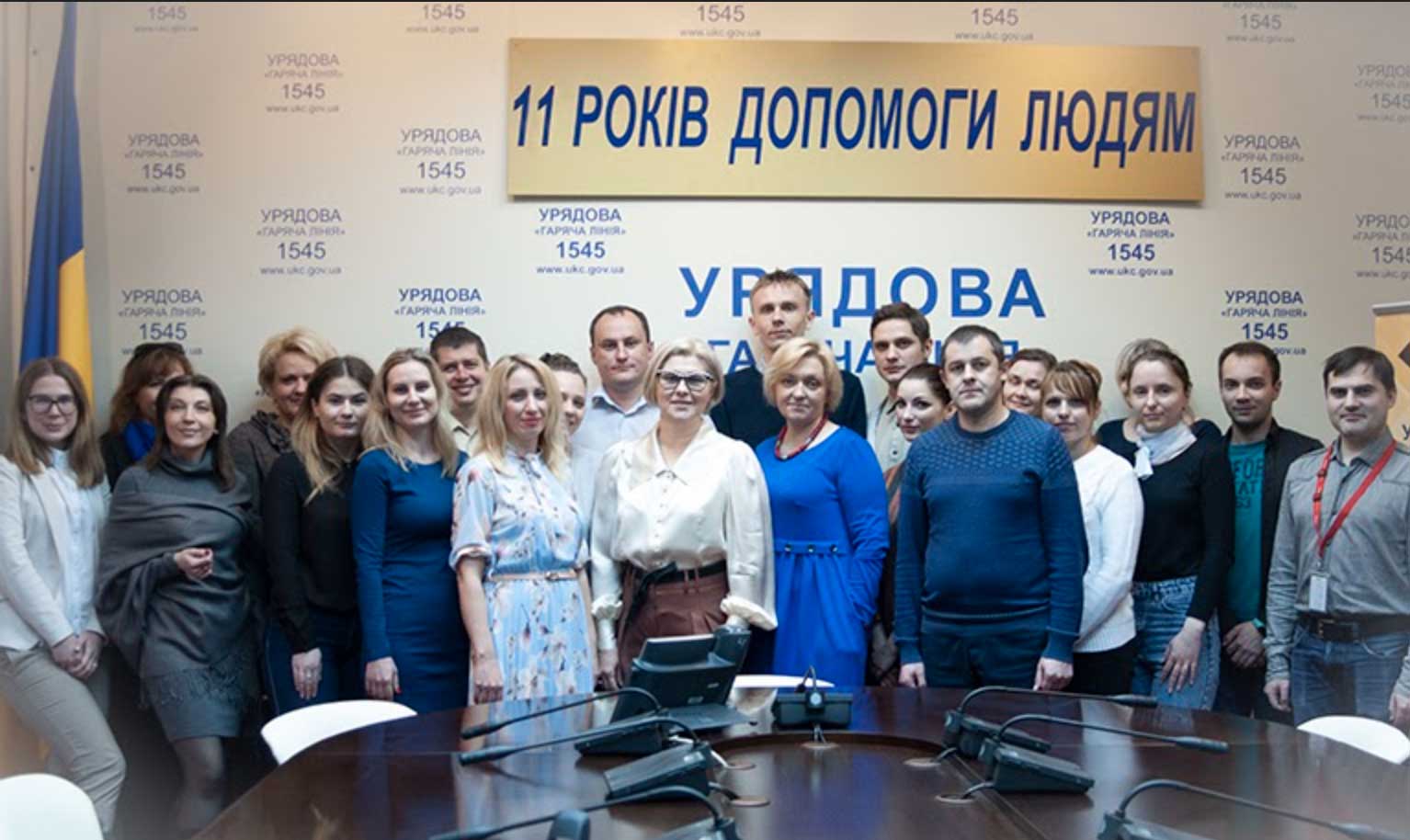 |
|---|
| The Government Contact Center management and consultants |
Do you have a hobby?
For a long time I was practising ballroom dancing. Now I do not have time for this. I practice at home on my own, using video lessons online. For many years I have been watching and training Cindy Crawford “Shape your body” course on YouTube.
Could you recommend several books or movies?
I try to read books on psychology and coaching now, which would help me in my work. I want to fight with the turnover of staff, with the emotional burnout of people at work, to learn to select people who will work with us not for 1-2 years, but at least 3-4. I liked Irina Reva's "Mission of the Third Generation", John Whitmore's "Coaching for Performance" and Gill Hasson's "Emotional Intelligence Pocketbook".
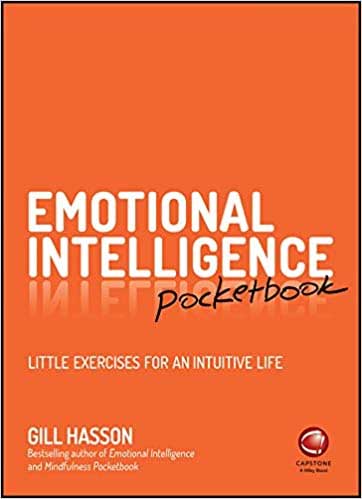 |
|---|
| Gill Hasson, “Emotional Intelligence Pocketbook” |
Could you describe the Center’s team?
We have a staff of 314 units today. The Government Contact Center is headed by the Director - Olga Kholomeeva, who manages, coordinates and regulates all functional processes of the Center, aimed at fulfilling the approved tasks of the Center. She is assisted by 4 deputies in various areas of the Center's activity. I am responsible for personnel, legal issues, financial and economic issues.
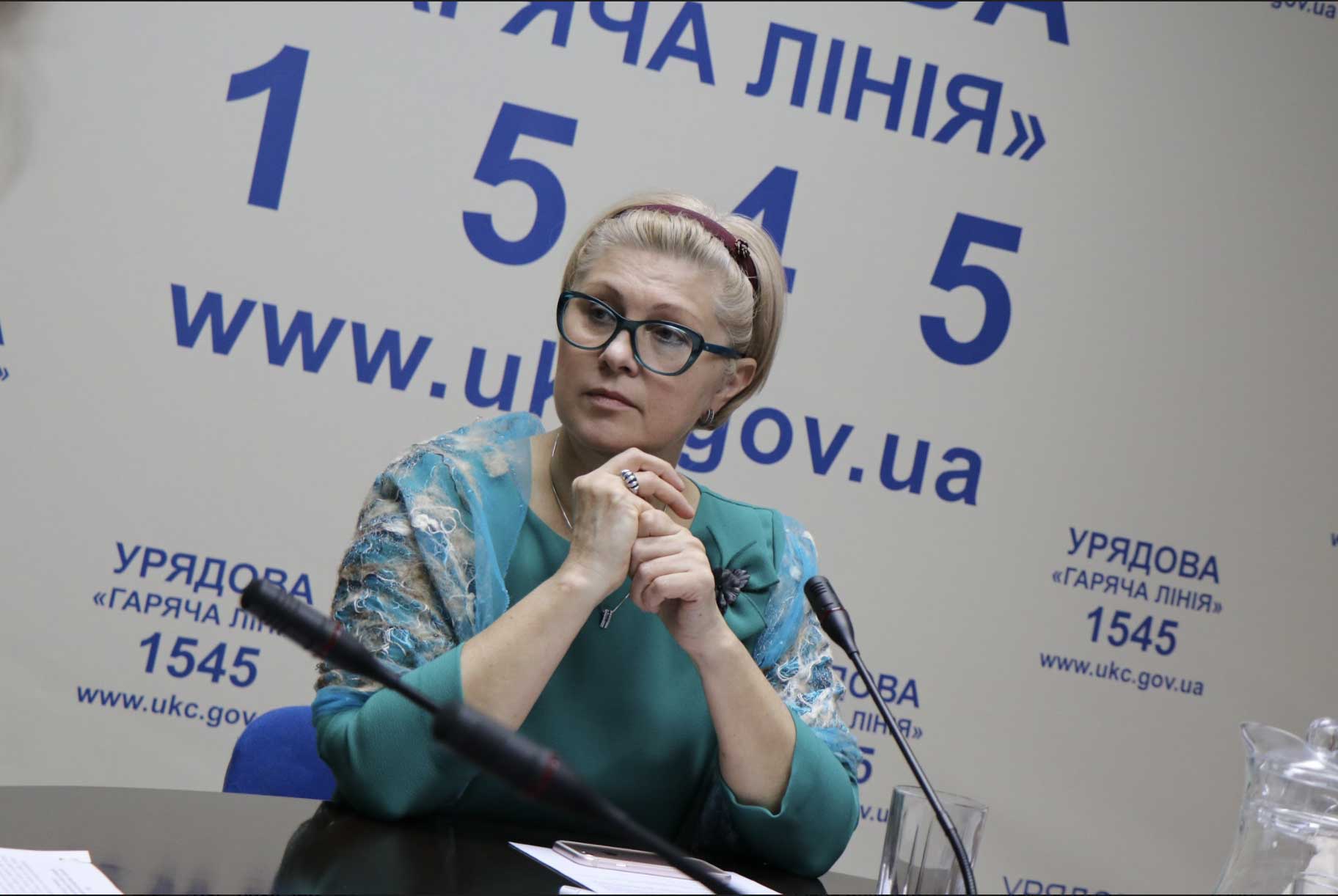 |
|---|
| Olga Kholomeeva, The Head of the Government Contact Center of Ukraine |
Deputy Director Dmytro Bodnar manages the department responsible for receiving and processing citizens' appeals: the call center, a separate unit for processing appeals on fighting the human trafficking and domestic violence, as well as the unit for processing appeals received via the Internet.
Marianna Vilshynska, Deputy Director, is responsible for training and motivating employees. We have a constantly updated consulting base in accordance with the latest legislation. There is a continuous learning process, development of tests to check the knowledge of consultants. The Center should also prevent emotional burnout, and we introduced various forms of non-financial motivation.
There is also Deputy Director Mykhailo Aleksanyan, who is engaged in technical equipment, uninterrupted round-the-clock operation of all resources, modernization of software and hardware.
What is the Government Contact Center of your dream? How the Center should look like in 3, 5, 10 years?
I would like the Government Contact Center to be more involved in the development of Government decisions concerning its work. Also in 2015, the initiative to establish a National Contact Center was discussed. After all, the Government Contact Center advises only on issues affecting the governmental bodies. And there are also questions to the Parliament, the Office of the Prosecutor General, NABU, SBU and other bodies.
If this vision is implemented, all government agencies will be able to install widgets on their websites to provide online consultations in chats through the web-site or in messengers like Viber, Telegram, Facebook, Apple Messages, Google Messages, etc.
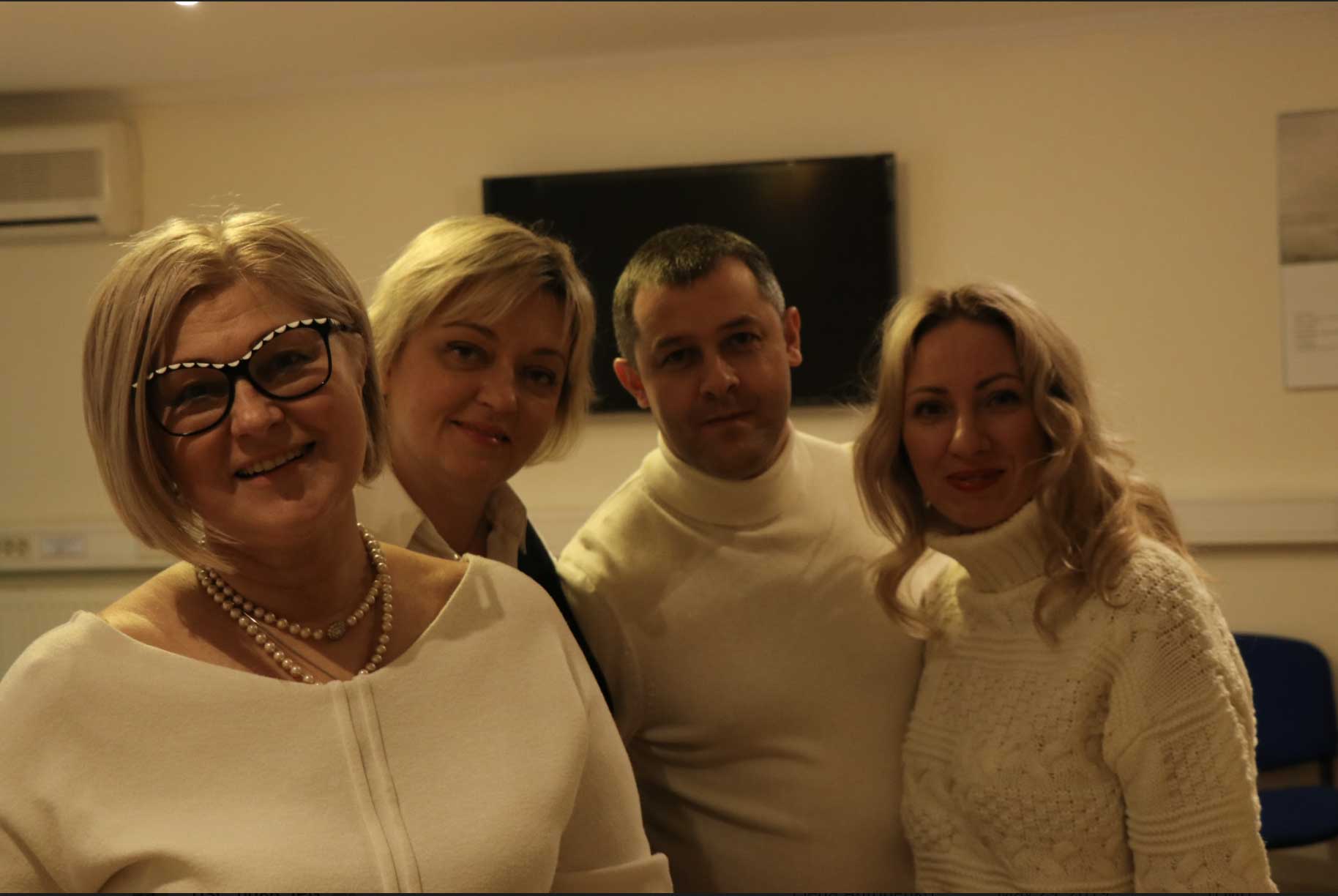 |
|---|
| Management team of the Government Contact Center (from left to right): Olga Kholomeeva (Director), Marianna Vilshinska (Deputy Director for Staff Training, Development and Motivation), Dmytro Bodnar (Deputy Director), Olena Antonenko (the First Deputy Director) |
Also, everyone probably noticed that we have almost no advertising of the Government Contact Center. We tell little about our work. Why? Because "demand" exaggerates our "supply" – the physical ability to process calls from anyone wishing to call 1545 and other "hotlines" created on the basis of the Government Contact Center. We manage to process only 60-70% of the calls.
Also I believe that regional contact centers should be involved in our work. In 2011, the National System for Processing Appeals to Government Bodies was launched, where all local authorities were instructed to establish regional contact centers. It was planned (and it happened) to finance these regional contact centers from the local budget.
But, in this case, what is the impact of the Government Contact Center on regional centers? None, except for methodological support. The introduction of unified standards in the work of regional contact centers is possible only if they are transformed into remote structural units of the Center itself.
Some of the regional contact centers work on the tasks and instructions of the regional state administration, some conduct regular hotlines for regional deputies, some simply collect some statistics as an analytical center, some act as consultants exclusively on communal services.
The Resolution of the Cabinet of Ministers of Ukraine on the approval of the Regulation on the National System for Processing Appeals and the Model Regulation on the Regional Contact Center was adopted on January 18, 2012. But during 2012-2013, only 20 regional contact centers were established. Today there are 16 of them, including the contact center 1551 in Kyiv.
I spent the whole last week in online meetings with the heads of the regional contact centers, trying to understand their position, whether they want to become a part of the Government Contact Center. More than half of the heads of regional contact centers support such an initiative.
If such changes are supported and take place, people in the regional contact centers will receive normal salaries, will start using the common standards of dialogues, the KPI system and rating, will have unified approaches to their work and clearly defined functionality and tasks. With the support of this initiative, the Center will significantly increase its staff and capabilities, in particular, increase the number of processed calls to the government hotline with a greater probability of a substantive solution.
Also I see an option – to develop relations with international partners. Today, in the development of the Government Contact Center, we often have limited funding from the state budget for development, strengthening the material and technical base and changes in the Center. The government contact center plays the main role in communication between the citizens and public authorities.
Indeed, whether in 3, or in 5 or 10 years, the "single window" of filing appeals to the State should be created, through which the citizen will be able to apply to any government agency, get the necessary information or advice as soon as possible to resolve their issue.
There should be a "single point" of contact, where the applicant can communicate conveniently and effectively with the authorities, using modern communication channels. In my opinion, for example, there should not be 70 hotlines in the governmental bodies.
It should not be the case that online support widgets are installed on some government websites, but not on all of them.
This all depends not only on my wishes, but also on the availability of possible funding, the settlement of these issues by the legal framework, the sustained transition period and the gradual introduction of a "single center" for appeals and consultations on all issues.

